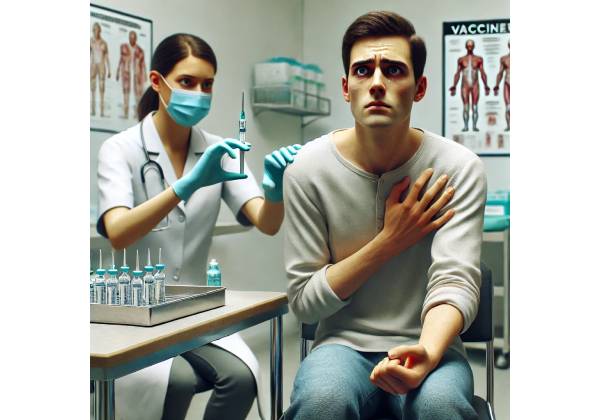
What is Vaccinophobia?
Vaccinophobia, also known as the intense fear of vaccines, is a specific phobia characterized by overwhelming and irrational anxiety about vaccination. Vaccinophobia is a more extreme form of fear than the common hesitancy that some people have about vaccines due to concerns about side effects or medical beliefs. For people who have this phobia, the thought of getting vaccinated can cause significant distress and even panic. This fear can be directed at a variety of vaccination-related issues, including needles, potential side effects, and concerns about vaccine ingredients.
Vaccinophobia can cause people to avoid vaccinations, putting them at risk for preventable diseases. Furthermore, this phobia can lead to feelings of isolation or anxiety, especially during public health campaigns that promote vaccination. Understanding vaccinophobia is critical in a world where vaccines play an important role in preventing the spread of infectious diseases. Individuals can overcome their fear by receiving the appropriate support and treatment, allowing them to make informed and safe health decisions.
By investigating the symptoms, underlying causes, and effective treatments for vaccinophobia, we can offer strategies to help affected people manage their fear and reduce vaccine-related anxiety.
What are the Symptoms of Vaccinophobia?
Vaccinophobia symptoms can be physical, emotional, or behavioral. They frequently arise when people are confronted with the prospect of vaccination, whether during a doctor’s appointment, a public health initiative, or simply hearing discussions about vaccines. These symptoms can range from mild anxiety to severe panic attacks, and understanding them is critical for diagnosing the condition and seeking appropriate treatment. Here’s a detailed look at the symptoms of vaccinophobia:
1. Physical Symptoms: The Anxiety Response
- Rapid Heartbeat (Tachycardia): People with vaccinophobia frequently experience an increase in heart rate when thinking about or encountering vaccine-related situations. This is part of the body’s normal fight-or-flight response.
- Shortness of Breath: The anxiety associated with vaccinophobia can make breathing more difficult, resulting in a sensation of chest tightness or hyperventilation.
- Sweating and Trembling: Exposure to vaccination settings can cause excessive sweating and noticeable shaking, especially in the hands and legs.
- Nausea or Gastrointestinal Distress: Fear of vaccines can cause digestive symptoms such as nausea, upset stomach, or even vomiting, particularly before getting vaccinated.
- Dizziness or Fainting: In severe cases, people with vaccinophobia may become lightheaded or faint. This symptom is occasionally associated with the vasovagal reflex, in which extreme anxiety causes a sudden drop in blood pressure.
- Chest Pain or Discomfort: Physical symptoms similar to a panic attack, such as tightness or discomfort in the chest, can exacerbate the individual’s fear.
2. Emotional and psychological symptoms
- Overwhelming Anxiety: Vaccinophobia is defined as intense and persistent anxiety that may occur not only during vaccination but also when considering future vaccinations.
- Fear of Harm or Contamination: Some people believe that the vaccine will harm them, cause illness, or introduce “contaminants” into their bodies. This may include concerns about vaccine ingredients like preservatives or adjuvants.
- Anticipatory Anxiety: This type of anxiety can develop several days or weeks before the vaccination appointment, causing increased worry and distress.
- Panic Attacks: In severe cases, vaccinophobia can cause panic attacks, which include symptoms like a racing heart, shortness of breath, dizziness, and an overwhelming sense of dread.
- Feeling of Helplessness or Loss of Control: Fear of vaccination can include a sense of being unable to escape or control the situation, particularly when confronted with mandatory vaccination policies or social pressure.
3. Behavioral Symptoms: Avoidance and Safety Behaviors
- Avoidance of Vaccination Settings: People with vaccinophobia will go to great lengths to avoid medical settings where they may be offered or required to be vaccinated. This may include avoiding doctor’s offices, pharmacies, and public health events.
- Refusal to Get Vaccinated: Fear may lead to a complete refusal to receive vaccines, even if this increases the person’s risk of preventable illnesses.
- Using Safety Behaviors: Some people may attempt to cope with their anxiety by carrying stress-relief objects, engaging in calming rituals, or requesting special accommodations (such as lying down during a shot).
- Researching Alternatives: Vaccinophobics may obsessively research alternatives to vaccination, such as natural immunity or holistic treatments, in order to avoid vaccination altogether.
- Over-reliance on Others: Some people may rely on family or friends to accompany them to vaccination appointments for emotional support, or they may avoid discussing vaccination at all to reduce anxiety.
4. Cognitive distress and catastrophic thinking
- Intrusive Thoughts about Harm: People with vaccinophobia may have persistent and distressing thoughts about the vaccine causing harm, serious side effects, or even death.
- Catastrophic Thinking: The individual may engage in worst-case scenario thinking, such as picturing a severe allergic reaction or permanent health damage caused by the vaccine.
- Overfocus on Vaccine Risks: There may be an undue emphasis on rare side effects or complications, resulting in an exaggerated perception of the risks associated with vaccination.
5. Impact on Daily Life and Emotional Wellbeing
- Social Withdrawal: Anxiety about vaccination can cause people to withdraw from social situations, especially if vaccines are discussed or vaccination requirements are imposed for activities or travel.
- Increased Stress Levels: Constant concern about vaccinations can lead to chronic stress, impairing sleep, concentration, and overall well-being.
- Health Risks from Avoidance: Fear can lead to delayed or missed vaccinations, leaving people vulnerable to diseases that could have been prevented with immunization.
Understanding these symptoms is critical for identifying vaccinophobia and distinguishing it from typical vaccine hesitancy. Early detection can lead to better management and a decrease in vaccine-related anxiety.
Causes and Risk Factors for Vaccinophobia
Individual experiences, societal influences, and psychological predispositions can all contribute to the development of vaccinophobia. The following are some of the primary causes and risk factors associated with this particular phobia:
1. Traumatic Medical Experience
- Previous Negative Reactions to Vaccines: Having a negative reaction to a vaccine, such as an allergic reaction or severe side effects, can cause vaccinophobia. The fear of a repeat experience can increase anxiety about future vaccinations.
- Childhood Trauma Involving Needles: Early experiences of pain or distress associated with injections or medical treatments can instill a lifelong fear of needles and vaccinations. This is especially true if the person was not properly prepared or supported throughout the experience.
2. Psychological and Emotional Aspects
- Generalized Anxiety Disorder (GAD) or Other Anxiety Disorders: People who are predisposed to anxiety disorders may be more likely to develop vaccinophobia because they are more sensitive to perceived threats.
- Fear of Needles (Trypanophobia): People who have a specific fear of needles may develop vaccinophobia as a result, especially since vaccinations require needle injections.
- Obsessive-Compulsive Disorder (OCD): People with OCD may develop a strong fear of contamination or harm from vaccine ingredients, which leads to avoidance behaviors.
3. Social and cultural influences
- Misinformation Exposure: The spread of false information about vaccines, such as unproven claims about harmful ingredients, side effects, or conspiracy theories, can fuel fear and mistrust.
- Parental or Familial Attitudes: Growing up in a home where vaccines are viewed with suspicion or fear can shape an individual’s attitudes toward vaccination. Parents who express concern about vaccines may unintentionally transmit these fears to their children.
- Media Portrayals: Media coverage emphasizing vaccine controversies, adverse effects, or anti-vaccine sentiments can exacerbate fears, increasing the likelihood of developing vaccinophobia.
4. Biological and evolutionary factors
- Genetic Predisposition to Anxiety: There could be a genetic component to developing specific phobias, such as vaccinophobia, especially if there is a family history of anxiety disorders.
- Evolutionary Fear of Contamination: Humans have an innate aversion to potential sources of contamination or infection. For some people, this can lead to a fear of substances injected into their bodies, such as vaccines.
Understanding the causes and risk factors can assist mental health professionals in developing more personalized and effective treatment strategies for vaccinophobia.
How Is Vaccinophobia Diagnosed?
A mental health professional will conduct a thorough evaluation of the individual’s symptoms, experiences, and the extent to which their fear interferes with their daily life in order to diagnose vaccinophobia. Here’s how the diagnostic procedure typically goes:
1. Clinical interview
- A clinical interview is the first step in diagnosing vaccinophobia. During the interview, the clinician will ask about the individual’s anxiety history, any traumatic medical experiences, and specific vaccine-related fears. The emphasis will be on the fear’s intensity, frequency, and duration, as well as any vaccination-related avoidance behaviors.
- The clinician will also evaluate the impact of the phobia on the individual’s health choices, such as avoiding necessary vaccinations or refusing to discuss vaccination options. The clinician will determine whether the individual’s fear goes beyond typical vaccine hesitancy and meets the criteria for a phobia. This includes determining whether the fear is persistent (lasting at least six months), excessive, and irrational, and whether it significantly interferes with daily functioning, such as avoiding healthcare services entirely.
2. Symptom Analysis
- To assess the severity of vaccinophobia, the clinician may employ standardized diagnostic tools or questionnaires, such as the Fear Survey Schedule (FSS), the Specific Phobia Questionnaire, or other anxiety inventories. These assessments aid in quantifying the level of fear, identifying triggers, and determining the extent of functional impairment.
- The evaluation will also look at physical symptoms (such as panic attacks), emotional responses (such as fear), and behavioral patterns (such as avoiding vaccination-related discussions or appointments).
3. Differential Diagnosis
- The clinician will look into other conditions that may have similar symptoms, such as generalized anxiety disorder (GAD), obsessive-compulsive disorder (OCD), or trypanophobia (fear of needles). The goal is to determine whether the fear is specific to vaccination or part of a larger anxiety issue.
- In addition, the mental health professional will determine whether the individual’s anxiety meets the criteria for a specific phobia as defined by the Diagnostic and Statistical Manual of Mental Disorders, Fifth Edition (DSM-5). The DSM-5 criteria for specific phobia include a severe and disproportionate fear of a specific object or situation (in this case, vaccination) that causes significant distress or avoidance behaviors.
Accurate diagnosis is critical for developing an effective treatment plan that addresses the unique aspects of vaccinophobia and offers strategies for overcoming it.
Best Treatment Options for Vaccinophobia
Vaccinophobia can be effectively treated with a variety of therapeutic approaches that address the phobia’s cognitive, emotional, and behavioral components. Treatment plans should be tailored to the severity of the fear, its specific triggers, and any co-occurring mental health conditions. The following are some of the most effective treatments for vaccinophobia:
1. Cognitive-Behavioral Therapy (CBT)
Cognitive Behavioral Therapy (CBT) is one of the most popular and effective treatments for specific phobias, such as vaccinophobia. This therapeutic approach focuses on identifying and changing negative thought patterns and beliefs that contribute to vaccination phobia.
- Cognitive Restructuring: This aspect of CBT assists people in challenging irrational beliefs about vaccines, such as the belief that all vaccines are dangerous or that receiving a vaccine will inevitably result in severe side effects. Individuals can reduce their anxiety and approach vaccination more rationally by replacing these beliefs with more realistic and evidence-based thoughts.
- Exposure Therapy: CBT frequently includes exposure therapy, in which people are gradually and methodically exposed to vaccination-related situations in a controlled setting. The exposure process may begin with less anxiety-provoking tasks, such as reading about vaccines or discussing them with a therapist, and then progress to visiting a clinic, observing someone else being vaccinated, or receiving a vaccination themselves. The goal is to desensitize the individual to the fear by gradually reducing the anxiety response.
- Behavioral Techniques: CBT includes strategies for managing avoidance behaviors. Individuals may practice coping skills, such as deep breathing or muscle relaxation, when exposed to vaccination settings, to help them remain calm during the experience.
2. Exposure Therapy
Exposure therapy is an essential treatment for phobias, and it is especially effective for vaccinophobia. The approach seeks to alleviate the individual’s fear by gradually exposing them to vaccination-related stimuli, thereby desensitizing them to anxiety triggers.
- Systematic Desensitization: This method entails creating a hierarchy of feared vaccination situations, starting with less distressing tasks like watching a video of someone getting vaccinated and progressing to more challenging activities like scheduling a vaccine appointment. The process is gradual, allowing the individual to gain confidence with each step.
- Virtual Reality Exposure Therapy (VRET): For those who find real-world exposure too overwhelming, VRET can simulate vaccination settings using virtual reality, allowing people to confront their fears in a safe, immersive environment.
3. ** Acceptance and Commitment Therapy (ACT)**
Acceptance and Commitment Therapy (ACT) is another effective way to treat vaccinophobia. ACT helps people develop a healthier relationship with their anxiety by accepting it as a normal part of life rather than something to be avoided.
- Mindfulness Techniques: ACT includes mindfulness practices that teach people to observe their anxious thoughts and feelings about vaccinations without passing judgment. This method helps people stay present and reduces the tendency to be overwhelmed by fear.
- Values-Based Action: ACT encourages people to identify their values and commit to actions that reflect those values, even if they are anxious about vaccination. For example, if someone values their health but avoids vaccines out of fear, ACT can help them take steps toward vaccination despite their anxiety, reinforcing the importance of health over fear.
4. Medications
While therapy is the primary treatment for vaccinophobia, medications can be used to treat severe symptoms, particularly if the fear significantly impairs daily functioning or prevents the individual from seeking necessary medical care.
- Selective Serotonin Reuptake Inhibitors (SSRIs): Antidepressants such as fluoxetine or sertraline are frequently used to treat anxiety disorders, including specific phobias. These medications help regulate serotonin levels in the brain, reducing anxiety and making it easier for people to participate in therapeutic activities.
- Benzodiazepines: For short-term relief of acute anxiety, benzodiazepines such as lorazepam or alprazolam may be prescribed prior to a vaccination. However, because of the risk of dependence, these medications are usually only used temporarily.
5. Hypnotherapy
Hypnotherapy can be an effective complementary treatment for vaccinophobia, especially for people who have strong emotional reactions to the prospect of vaccination. During hypnotherapy sessions, a trained therapist guides the individual into a deep state of relaxation, making them more open to positive suggestions aimed at reducing fear.
- Relaxation Techniques: Hypnotherapy can teach people how to enter a calm state when confronted with vaccination, reducing the anxiety associated with the experience.
- Reframing Negative Associations: Hypnotherapy can also help people change their negative beliefs about vaccines by guiding them to visualize positive outcomes of vaccination, such as increased disease protection.
6. Psychoeducational and self-help strategies
Educating oneself about the safety and benefits of vaccines can help people with vaccinophobia make more informed health decisions. Self-help strategies can supplement professional treatment by providing practical tools for managing fear.
- Learning about Vaccine Safety: Understanding how vaccines are developed, tested, and monitored for safety can help alleviate fear caused by misinformation or exaggerated risks.
- Gradual Exposure on One’s Own: People can begin by becoming familiar with vaccine-related topics, such as reading about the benefits of immunization or watching educational videos, and then move on to scheduling a vaccination appointment.
- Mindfulness and Relaxation Techniques: Deep breathing, meditation, and progressive muscle relaxation can help people stay calm during vaccination appointments.
7. Support groups and peer therapy
Individuals with vaccinophobia can use support groups to share their experiences, learn from others, and be encouraged by people who understand their fears.
- Group Therapy: Guided by a licensed therapist, group therapy may include discussions about coping strategies, exposure exercises, and relaxation techniques.
- Online Communities and Forums: Virtual support networks allow individuals to connect and discuss strategies for overcoming their fear of vaccination.
8. Combined Therapy
A combination of therapeutic approaches frequently produces the best results. Integrating CBT with exposure therapy, medication, or ACT results in a comprehensive treatment plan that addresses the cognitive, emotional, and behavioral aspects of vaccinophobia.
Collaborating with a mental health professional to develop a personalized treatment plan ensures that the approach is tailored to the individual’s specific needs, increasing the likelihood of overcoming fear.






